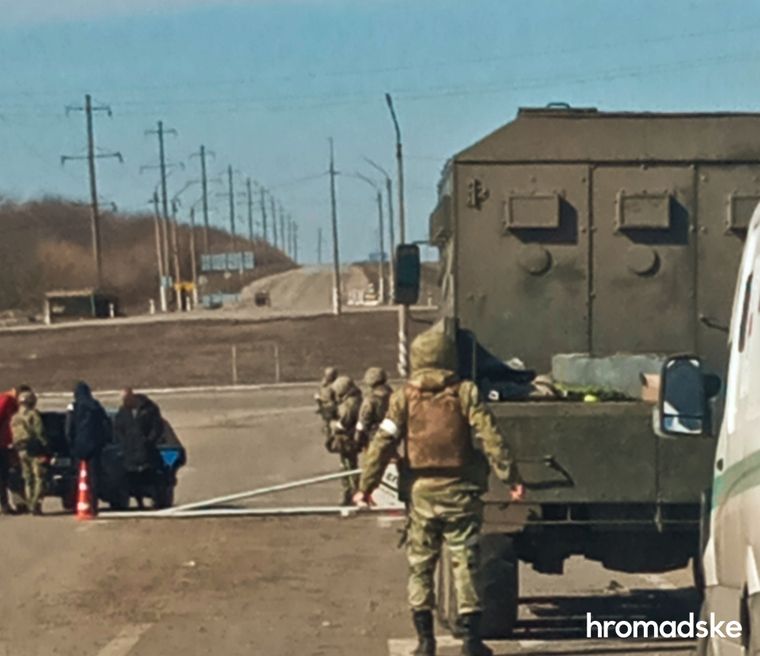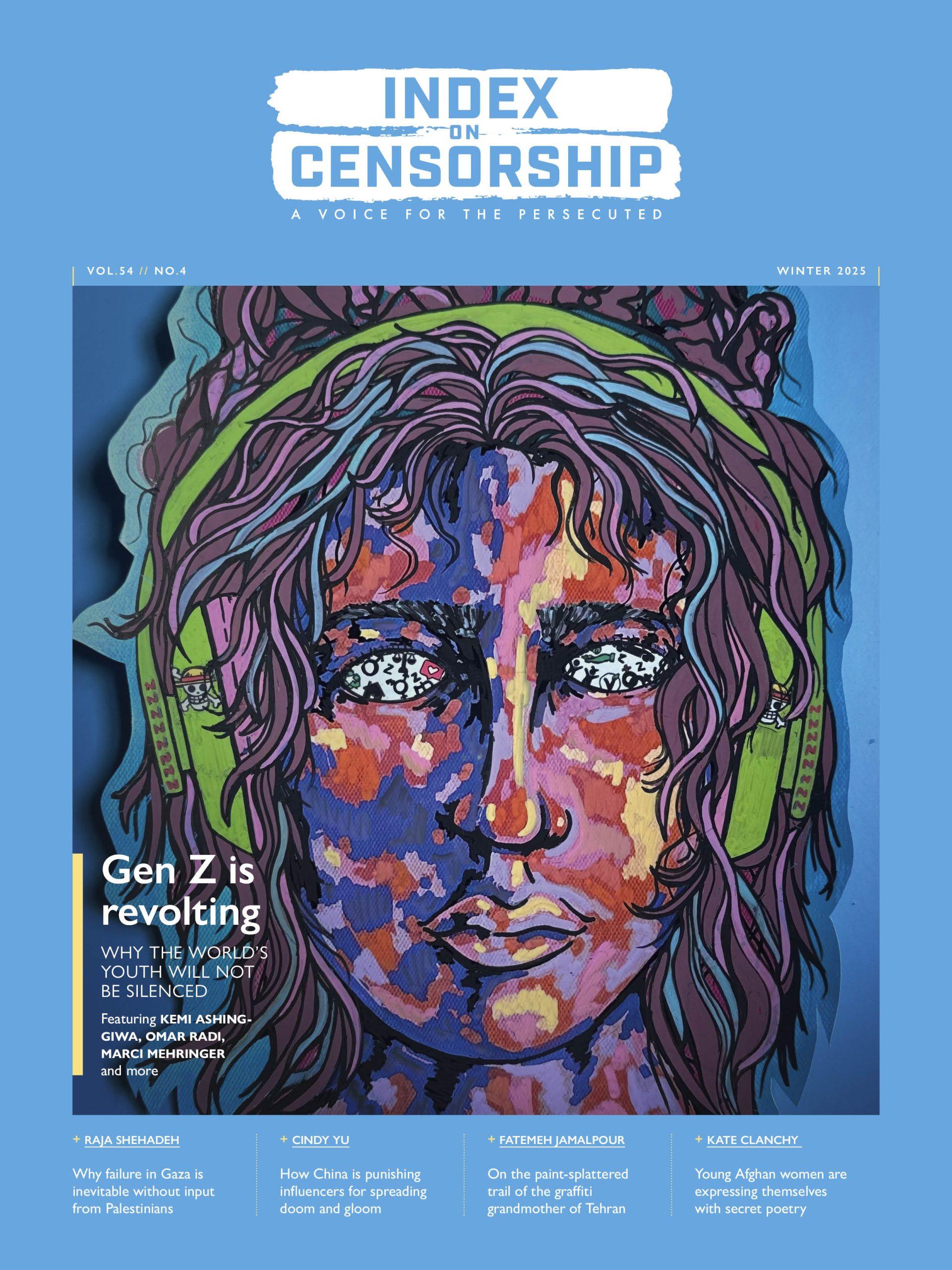This article was first published on 5 April 2022 and is being republished following confirmation of her death in Russian custody.
I was in Zaporizhzhia on the morning of 12 March. I wanted to get to Mariupol to write an article; I thought that I had to tell the truth from the blocked city. It was my initiative.
I found out that a humanitarian convoy was going to Mariupol. I went to the assembly point but the convoy had already left. I contacted the authorities and asked them if I could catch it up. They replied that I could try. I did not find a personal driver, so I left with another convoy heading to Polohy. We caught up the Mariupol convoy near Vasylivka, and I continued with them.
I came across the occupiers’ first checkpoint in Vasylivka. Russian soldiers thoroughly checked me. They made me unzip my coat and show the contents of my bag. They found a camera and asked if I was a journalist. I confirmed this. They told me that I had no business in Mariupol and that I should return to Zaporizhzhia. They inspected my phone and camera and found nothing. I asked permission to continue with the column. The occupiers did not mind. We stopped overnight in Berdyansk.
We continued our way in the morning but we were stopped near the city limits and we were told to wait for permission. We were waiting for two or three hours by a crossroads where the roads to Mangush, Energodar and Vasylivka go. Rumours started to spread that we wouldn’t be allowed to move.
Cars passed by and a woman from the convoy told us that she had found some local guys who were willing to drive us to Mariupol. When we arrived at the agreed place, the car was no longer there. The Russian military told us to wait and started talking with us.
I stepped aside. I was thinking of returning to the convoy but a Russian soldier approached me and asked me to show him my phone. He told me that he had instructions from above to check me.
He asked if I was a journalist. I did not lie as it could make things even worse. He asked to show him my WhatsApp account and he saw the contact of the security services of Zaporizhzhia. There was a message with a request to publish a video of a Russian soldier who had swapped sides to join Ukraine.
Some other soldiers began to interrogate me. Then they spoke with Metropolitan Luka [a priest of the Ukrainian Orthodox Church]. Luka and other clerics were leading the convoy. When they returned, they said I had to go with them. I was put into a prison van accompanied by four Chechen paramilitaries who took me to the Berdyansk district administration office.
I was met by people dressed in black and wearing balaclavas. They seemed to be very young, less than 30 years old. They started to interrogate me, searching me and inspecting my phone and documents. They told me that I was not a journalist but a spy and a propagandist which I denied. It lasted for an hour. Then, one of them said: “Everything is clear with you”. I realised later they were from the Russian security services, the FSB.
One of the men in balaclavas brought in his commander. When I asked him who he was, he replied: “I am the man. You have two options: you either go to a jail for women or to a Dagestani military base.” I asked them what that meant. They did not explain. Then two men grabbed me, put a blindfold over my eyes and took me out of the room. I was crying, explaining that I was a journalist, that people would be looking for me, and that they would not get away with it. They took me to the local office of the SBU, the Ukrainian Security Service.
I was met by Chechens and Dagestanis who put me in a tiny room with a chair, a table and a window which they closed and told me not to approach it. They brought a blanket on which I slept on the floor. It was light and warm there. I was taken out only to the bathroom. Almost all my stuff was taken. When I asked when they would let me go, they answered, “When Kyiv is taken”. They added “Luka is in charge of the convoy and he refused to take you”.
From time to time, I was interrogated by Russian occupiers.
“We have no conscience. The law does not exist for us,” the FSB guys said. “Ukraine does not exist anymore.”
They repeated this every day.
“If we bury you somewhere here, no one will ever find out. You will be lost forever,” they said.
I had no fear. I knew they were trying to break me. But I felt desperate because I knew nothing about the outside world, and I was not able to do my job.
“We do not fucking care that you are a woman and a journalist,” they shouted.
But I knew the fact that I was a journalist restrained them.
At some point Chechens joined in with the daily moral pressure of the FSB guys. They guarded me and tried to convince me to cooperate.
“They are serious. They won’t let you go for nothing. You’d better to cooperate with them because you are so young. Otherwise, you will stay here forever,” they said.
They added: “We are the power. They are the brains.”
They brought me some food, but I refused. The first days I ate my remaining supplies from Zaporizhzhia. When it was finished, I took nothing but sweet tea. I felt my energy leave me. It was difficult just to get on my feet. During the last visit of the FSB men, I was not able to stand. But I continued to demand my release. When I cried too loud, one of the Chechens hit me and told me that I wasn’t at home, and I should watch my tone.
There were a few empathetic men among them, nevertheless. They came to ask if I was OK, asked me to eat something and begged me not to kill myself.
I asked to be allowed to make a call. They refused. Afterwards, the FSB told me that there would be a neutral interview and then I would be released. I insisted that I wouldn’t lie. They agreed. They brought a camera after a while. They had a prepared text with them, and they demanded I read it. I did not agree with the wording “high probability of having saved her life”. Eventually I agreed to shoot the video and they dropped the previous demands regarding full support of Russian actions and accusations against Ukraine.
Once the video was completed, they took me to another place. It was the local jail in Berdyansk. They refused to return my phone and camera as they considered them “propaganda tools”.
I spent the night in a room with a Russian soldier, who was supposed to guard me. The electricity and heating were cut off during the night. It was very cold. With my flashlight I counted the hours until morning. The soldier told me that the people who had interrogated me were from FSB. He was afraid that I would kill him during the night. He asked me whether I considered them as occupiers. Then he put the Ukrainian flag and the national emblem near me and said: “This is to calm you down. You see, we did not destroy them.”
In the morning, they blindfolded me again. Then they took me out of the jail and showed me the direction to go. I reached the closest bus station and went to the location of an evacuation convoy. I left with them the next day to territory controlled by Ukraine.
I am sincerely grateful to everyone who put in their efforts to find me and release me.
This account was first published by independent Ukrainian news channel hromadske and is published here in English for the first time.






